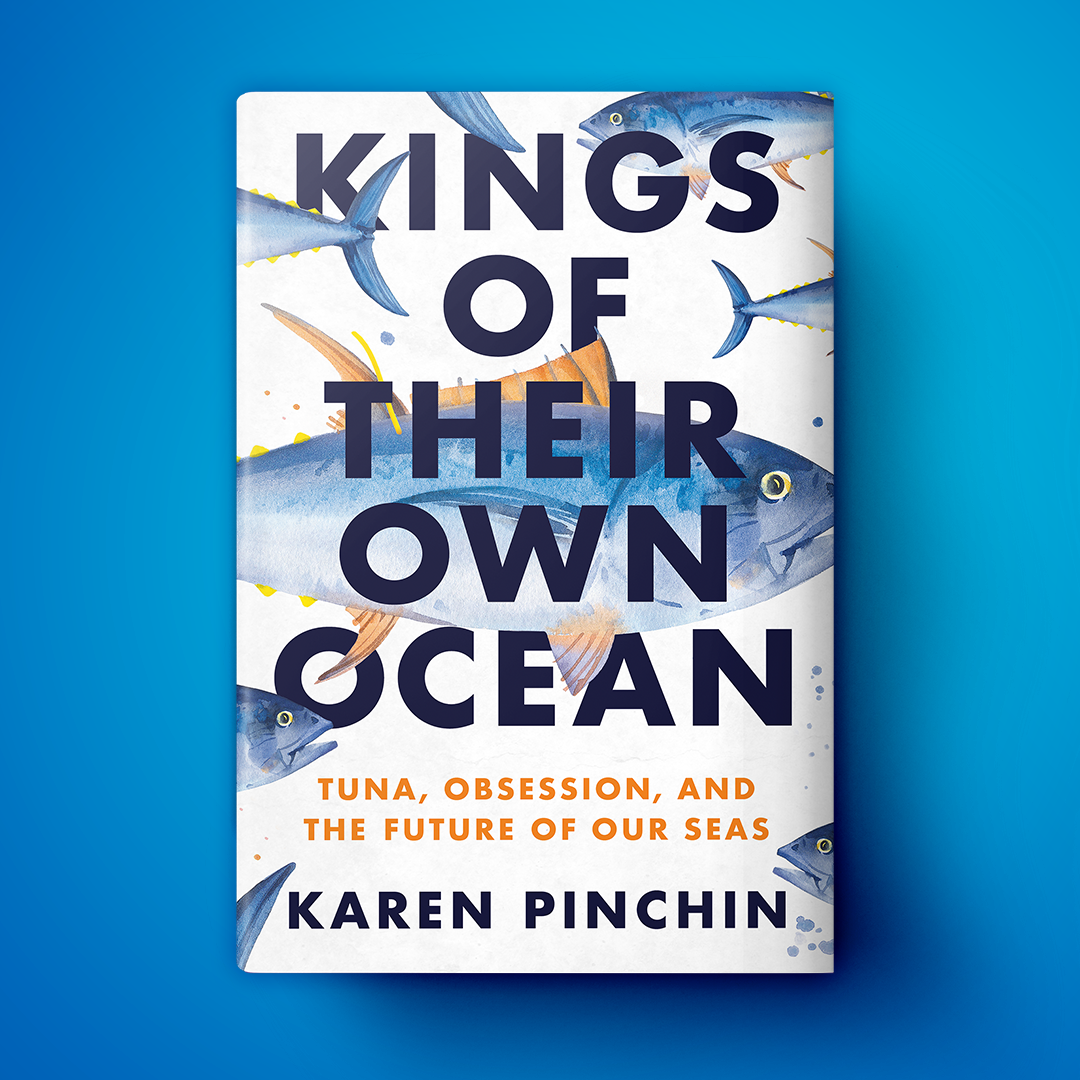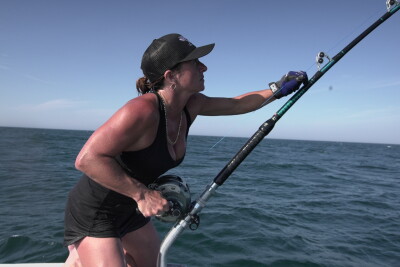Book review: Kings of Their Own Ocean: Tuna, Obsession, and the Future of Our Seas by Karen Pinchin
The first time I saw a bluefin tuna, as a young teen, I was entranced. From high up in a boat’s tuna tower, I marveled at the cobalt blue torpedo as it moved effortlessly forward, its tapered tail tastefully accented with contrasting yellow finlets. Later, admiring its brilliant silver side on the deck, massive black eye, its length, and girth, it was I, not the fish, that was hooked, and the bluefin became an obsession for me.
Karen Pinchin’s obsessive quest started similarly with a single tuna, and after an exhaustive effort spanning oceans and industries, she’s compiled a comprehensive volume on the history, management, and conservation of the bluefin tuna; past, present, and with a look toward the future.
Ostensibly, it’s the story of a tuna named after Amelia Earhart for her ocean-spanning journeys, and a fisherman named Al who first caught and tagged Amelia before she was caught and tagged again, then fourteen years later was found in a Mediterranean fish trap. The author takes you on a globe-spanning, industry-hopping journey from the prehistoric to the present. Her obsession-driven investigation reveals the science, business, crime, and environmental justice, along with some of the more noteworthy personalities associated with the fishery, not to mention a nearly complete history of Atlantic bluefin tuna fishing.
Along the way you’ll meet Al Anderson, a character central to the story and a pioneer in bridging the gap between fishing, science and management. You’ll learn much about Anderson’s own history, which is important to understanding his motivation. Upon recognizing the plight of the species, he made a transition from catch-and-kill charter captain to catch and release citizen scientist – ultimately tagging over 60,000 tuna and earning a place in the International Game Fish Association Hall of Fame.
You’ll meet researcher Molly Lutcavage, who fortuitously happened into a tuna research effort at just the right time and ended up conducting some ground-breaking work. When some scientists and environmental crusaders were claiming bluefin stocks were possibly as low as a few thousand individuals, Molly found them by the tens of thousands during offshore aerial surveys, then launched a tagging program where her, Amelia’s and Al’s paths crossed.
Working with commercial fishermen rather than against them, she also became a proponent of her and Anderson’s mentor, Frank Mather, and his contentions of stock mixing and unrecognized breeding areas. And you’ll learn about the boom, bust and resurrection of the Mediterranean trap fishery, where Amelia appeared again.
The author’s historical accounts take you from subsistence fishing in the Mediterranean over 2,000 years ago to Wedgeport, Nova Scotia, and the dawn of recreational tuna fishing in the 1930s, the rise of commercial fishing after World War II and through the Wild West days of the 1970s and ‘80s. You’ll learn about the history and life history of this remarkable species, the biggest, fastest, warmest and most charismatic of the finned fishes.
She introduces you to the Reverend Sun Myung Moon, whose Unification Church and its disciples were much maligned, mostly because they were strange and foreign. But Moon had a deep love and respect for the bluefin, and a vertically integrated business plan that spanned from hook to table, and was instrumental in opening Asian markets and boosting bluefin prices to previous unimaginable levels. No story about tuna would be complete without some mention of sushi, particularly as it was a driving force behind the modern bluefin sales boom, and the author manages to succinctly cover the story of sushi in just a few paragraphs.
It helps that like the rest of we bluefin disciples, Pinchin is not merely enamored, but is obsessed with bluefin tuna, and has gone to great lengths to turn that obsession into a comprehensive piece of literature. She writes in a flowing, comfortable style and offers intimate testimony from grizzled veteran anglers, noteworthy scientists, environmentalists, and tuna industry professionals. In doing so, she seamlessly weaves the stories of those she met and interviewed along the way into the fabric of the tale.
A lot of the book’s content hit home for me as it will for anyone who is or has been involved in the bluefin fishery, whether commercial, recreational, scientific or managerial. I recognized names of people I fished with in the ‘70s, and people I work with today. What really stood out for me though is that most of the story – the rise of western Atlantic bluefin fishing, dramatic price increases from a penny a pound to $2, the EEZ, overseas export, a potential population crash, seminal research, recovery and a hopeful path to the future have all occurred in a single lifetime, my lifetime.
In reading, you’ll learn a lot more about how and why bluefin are managed, the science and unfortunately politics behind the management, why the old models are flawed and why there might be some reason for optimism. Pinchin discusses a paradigm shift, a bold new direction for bluefin management. The Management Strategy Evaluation model, which I’ve been involved with through the Atlantic Highly Migratory Species Advisory Panel and which was adopted at the most recent ICCAT meeting could, according to Pinchin, “... serve as the scaffolding for a new, more accurate framework for managing bluefin...” That’s somewhat understated as it is not only science based, but incorporates all the science available, including ongoing tagging, aging and DNA analysis.
As the author herself states: “It wasn’t just a story of one fisherman and a single fish, but a story about the whole world, of contested science and corruption, of the miracles and terrors of globalization and its goddamned children: commodification and the perils of human hubris in driving a species to its absolute limit even as our warming climate transforms the ocean at a dizzying pace.” This volume will take its rightful place among the top shelf tuna classics and is a must-read for all obsessed with bluefin tuna.
It’s worth a read for the history alone because, as that old saw says, “Those who don’t study history are doomed to repeat it.”
KINGS OF THEIR OWN OCEAN: Tuna, Obsession, and the Future of Our Seas
Bob Humphrey is a Maine charter captain, commercial and recreational bluefin fisherman, and a member of the National Marine Fisheries Service Atlantic Highly Migratory Species Advisory Panel. www.bobhumphrey.com






